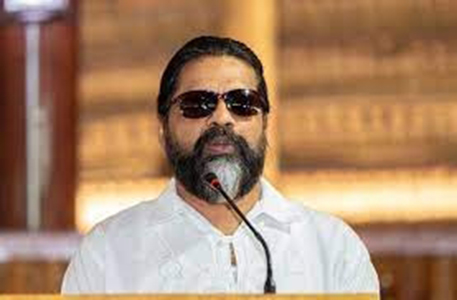Guyana Consumers Association (GCA) consultant Dr Yog Mahadeo has said consumers are “disappointed and aggrieved” at the Public Utilities Commission (PUC) recent decision to retain the Guyana Water Inc. (GWI) $7,500 reconnection fee for those whose water supply has been disconnected.
“…We abhor an unjust high rate of reconnection…,” Mahadeo told Sunday Stabroek in an invited comment in response to the decision. “We do feel aggrieved that the reconnection fee remains inhumanely high.”
Nevertheless, he said aside from the rates, consumers applaud the ongoing work of GWI to improve its service, while noting that the GCA will continue to “reassess” and “re-examine” costs as it relates to GWI and other utility companies.
In a decision rendered in Order No. 2 of 2022 as it relates to the review of Residential Reconnection Non-Voluntary Fees approved under Order 2 of 2018 for GWI, the PUC on Friday ruled that while the $7,500 fee for reconnection of the water supply to residential customers is “steep,” it “shall remain in place.”
It, however, decided, among other things, that from January 1 of next year there will be an increase in the company’s credit limit from $10,000 to $12,500 to allow consumers an extended grace period for payments.
The Commission said in its decision that it is conscious that the actual costs relating to disconnections and reconnections are in most instances above that of the rate set by the Commission in 2018 and that the ‘turn off’ option which costs the company $6,600 is not a viable option by the company for repeated/delinquent consumers.
According to the Commission, it “also recognizes that the fee of $7,500 is inclusive of the costs associated with both the disconnection and reconnection of consumers.
It, however, ordered that effective January 1, 2023, GWI is to increase its credit limit from $10,000 to $12,500 to allow consumers an extended grace period for payments and extend the 4-hour disconnection notice given to consumers to 24 hours.
Further, the Commission has ordered GWI to review the costs associated with the disconnection and reconnection of consumers with what it says must be a view to implementing cost effective disconnection methods in an effort to decrease any deficit to the Company as a result of disconnections and reconnections.
The Commission said it is of the view that the reduction of the non-revenue water and the continuous metering of unmetered consumers should have the consequential effect of resulting in the increased cash inflows to the company.
The GCA had challenged the GWI to justify and reduce the fee.
At one of the hearings before the PUC last month, Chief Executive Officer (CEO) of GWI, Shaik Baksh, had said that freely reconnecting its service to disconnected customers, as the Consumers Association had suggested, would plunge the utility company further into debt.
At the hearing, Baksh had stressed that the reconnection fee was far below what the company was paying contractors for disconnecting delinquent customers. “We cannot disconnect and reconnect freely without a charge. This will have an impact on GWI’s debts and our debts [are] going up every day. We have a concern about that… We must impose a reconnection charge…,” he had said.
Mahadeo had made an impassioned plea to the company to reassess and redress the reconnection cost, which he had described as “super high.” Mahadeo argued that it was their view that the company is utilising the opportunity for profit gains under the cover of tariff and reconnection fees.
Mahadeo on behalf of the GCA had pleaded with the commission to overhaul the rates reassess and remove the “draconian reconnection rates” and recommended that reconnection rates be no more than $100.
Baksh called the $100 reconnection fee proposed by the GCA ridiculous, saying it would put a dent in the company’s finances.
Several factors
Mahadeo yesterday explained to Sunday Stabroek that the GCA plea for a reduction was based on a number of factors, which include that the cost of living is “extremely” high and “uncontrollable” in Guyana and that water is a human right, recognized by the UN Charter and that disconnection removes that right.
Others factors, he said, include a need for “disaggregate” disconnection and reconnection costs from the total “reconnection transaction”.
“Our argument was that disconnection is a decision of the utility so as to protect its assets and recoup debts. Once a consumer clears all debts, there is a basis for forward that meets both the needs of the consumer (for water) and GWI (for revenues). To this end we have argued that since the main revenue generator is from the sale of water to consumers, the scope of reconnection fee should not be punitive,” Mahadeo explained.
Additionally, he said that the earlier-referenced order that initiated the $7.500 rate was based on misrepresentation of GWI’s costs since the “new” management of GWI made a public cry about rightsizing and getting rid of hundreds of employees that were brought on by the former management under the APNU+AFC Government.
Other factors under which the plea was made, Mahadeo said, include the need for a forensic audit of GWI and its cost reports – since it is and has been prone to political diktat which leads to inefficiency that consumers have to pay for and the fact that in other countries utilities restrict but not remove water supply
“Consumers have noted that the Order 2 of 2022 recognized that the real cost of the disaggregated reconnection was G$3,800 but allowed GWI to continue charging G$3,700 to domestic consumers for the disconnection segment,” Mahadeo said.
He told Sunday Stabroek that the GCA is thankful that the PUC has allowed the hearing of their case and has implemented measures that promises to offer “some” degree of relief to consumers. “We welcome the increased credit limit, the extension of the time after disconnection notice and the ability to include the reconnection into payment plans. These will go a far way for most consumers,” Mahadeo noted.






